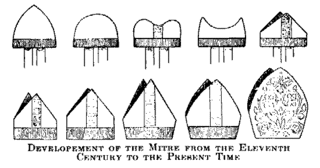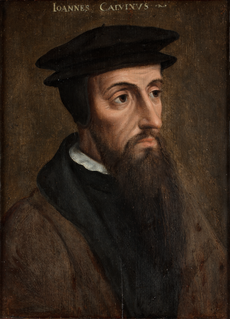
A bishop is an ordained or appointed member in a religious institution, who is generally entrusted with a position of authority and oversight. The title is most often used in Christian Churches, but is also used in some Japanese Buddhist institutions, and by the Japanese new religion Tenrikyo.

An episcopal polity is a hierarchical form of church governance in which the chief local authorities are called bishops. It is the structure used by many of the major Christian Churches and denominations, such as the Catholic, Eastern Orthodox, Oriental Orthodox, Church of the East, Anglican, and Lutheran churches or denominations, and other churches founded independently from these lineages.
The General Synod is the title of the governing body of some church organizations.

The Presbyterian Church (USA), abbreviated PC(USA), is a mainline Protestant denomination in the United States. It is the largest Presbyterian denomination in the US, and known for its relatively progressive stance on doctrine and ordains women and LGBT community as elders and ministers. The PC(USA) was established by the 1983 merger of the Presbyterian Church in the United States, whose churches were located in the Southern and border states, with the United Presbyterian Church in the United States of America, whose congregations could be found in every state. The similarly named Presbyterian Church in America is a separate denomination whose congregations can also trace their history to the various schisms and mergers of Presbyterian churches in the United States. [Unlike the PCA, the PC(USA)] supports evangelical feminism and supports practise of same gender marriages. It also welcomes gay and lesbian persons to serve in leadership positions as ministers, deacons, elders, and trustees.

In church governance, a diocese or bishopric is the ecclesiastical district under the jurisdiction of a bishop.
Presbyterianpolity is a method of church governance typified by the rule of assemblies of presbyters, or elders. Each local church is governed by a body of elected elders usually called the session or consistory, though other terms, such as church board, may apply. Groups of local churches are governed by a higher assembly of elders known as the presbytery or classis; presbyteries can be grouped into a synod, and presbyteries and synods nationwide often join together in a general assembly. Responsibility for conduct of church services is reserved to an ordained minister or pastor known as a teaching elder, or a minister of the word and sacrament.

A synod is a council of a church, usually convened to decide an issue of doctrine, administration or application. The word synod comes from the Greek: σύνοδος [ˈsinoðos] meaning "assembly" or "meeting" and is analogous with the Latin word concilium meaning "council". Originally, synods were meetings of bishops, and the word is still used in that sense in Catholicism, Oriental Orthodoxy and Eastern Orthodoxy. In modern usage, the word often refers to the governing body of a particular church, whether its members are meeting or not. It is also sometimes used to refer to a church that is governed by a synod.
The Evangelical Lutheran Church in America (ELCA) is a mainline Protestant Lutheran church headquartered in Chicago, Illinois. The ELCA was officially formed on January 1, 1988, by the merging of three Lutheran church bodies. As of 2019, it has approximately 3.3 million baptized members in 8,972 congregations.

The Cumberland Presbyterian Church is a Presbyterian Christian denomination spawned by the Second Great Awakening. In 2015, it had 70,810 members and 709 congregations, of which 51 were located outside of the United States. The word Cumberland comes from the Cumberland River valley where the church was founded.

The United Church of Christ (UCC) is a mainline Protestant Christian denomination based in the United States, with historical and confessional roots in the Congregational, Calvinist, Lutheran, and Anabaptist traditions, and with approximately 4,852 churches and 802,356 members. The United Church of Christ is a historical continuation of the General Council of Congregational Christian churches founded under the influence of New England Pilgrims and Puritans. Moreover, it also subsumed the third largest Calvinist group in the country, the German Reformed. The Evangelical and Reformed Church and the General Council of the Congregational Christian Churches united in 1957 to form the UCC. These two denominations, which were themselves the result of earlier unions, had their roots in Congregational, Lutheran, Evangelical, and Reformed denominations. At the end of 2014, the UCC's 5,116 congregations claimed 979,239 members, primarily in the U.S. In 2015, Pew Research estimated that 0.4 percent, or 1 million adult adherents, of the U.S. population self-identify with the United Church of Christ.
The Confessing Movement is a lay-led conservative Christian movement that opposes the influence of liberalism and progressivism within several mainline Protestant denominations and seeks to return them to its view of orthodox doctrine.

The Church of South India (CSI) is a united Protestant Church, being the second-largest Christian church in India based on the number of members; it is the result of union of a number of Protestant churches in South India.

The Presbyterian Church in the United States of America (PCUSA) was the first national Presbyterian denomination in the United States, existing from 1789 to 1958. In that year, the PCUSA merged with the United Presbyterian Church of North America, a denomination with roots in the Seceder and Covenanter traditions of Presbyterianism. The new church was named the United Presbyterian Church in the United States of America. It was a predecessor to the contemporary Presbyterian Church (USA).
A presiding bishop is an ecclesiastical position in some denominations of Christianity.
Ecclesiastical polity is the operational and governance structure of a church or of a Christian denomination. It also denotes the ministerial structure of a church and the authority relationships between churches. Polity relates closely to ecclesiology, the study of doctrine and theology relating to church organization.

Christianity is a minority religion in Sri Lanka. Christianity was introduced to the island in first century, probably in AD 72. Traditionally, after Thomas the Apostle's visit in Kerala in AD 52, Christianity is said to have been introduced via India because of its close geographical and commercial ties. According to Christian traditions, the apostle Thomas preached the Gospel in Sri Lanka. Records suggest that St. Thomas Christians and Nestorian Christians lived in Sri Lanka. Anuradhapura cross is one of the archaeological claims that suggest Christianity in Sri Lanka before the Portuguese. Roman Catholicism was introduced by the Portuguese in 1505. There were conversions by Dutch persons in the 17th century, which resulted in a percentage of church members in excess of 10%.

Presbyterianism has had a presence in the United States since colonial times and has exerted an important influence over broader American religion and culture.










